Understanding Autism Resources in North Carolina
North Carolina hosts a robust network of autism resources, organizations, and programs designed to support individuals with autism and their families across the state. From clinical services and educational programs to advocacy groups and community events, the state dedicates extensive efforts to improve quality of life, support lifelong development, and promote inclusion for those on the autism spectrum.
Overview of Autism Support Services in North Carolina
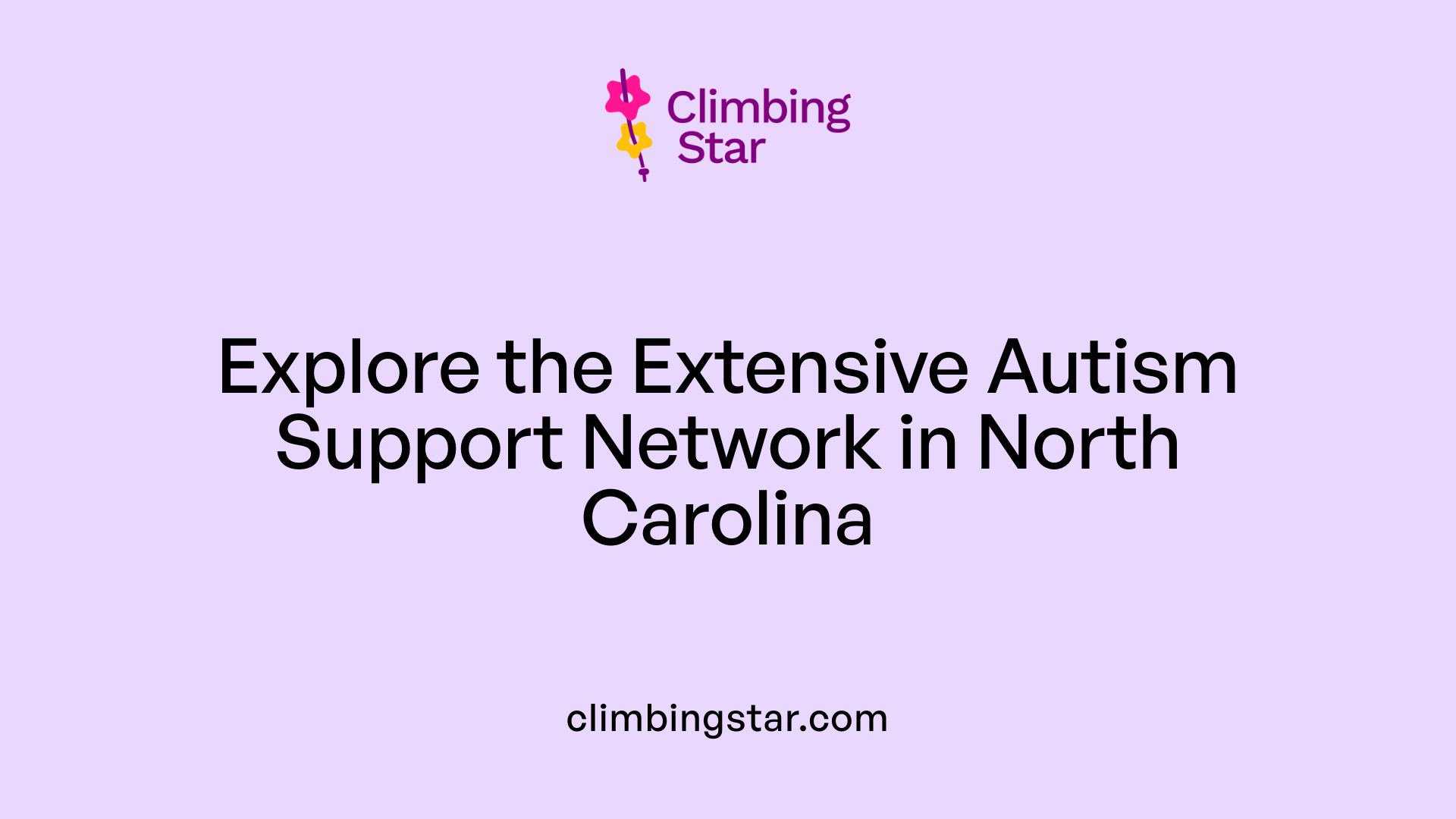
What autism resources and support services are available in North Carolina?
North Carolina provides a wide variety of support options for individuals with autism and their families. The Autism Society of North Carolina (ASNC) is a prominent organization that offers community programs, educational webinars, and events such as the Fall Run/Walk for Autism. They have Autism Resource Specialists in every county, ensuring that families across the state can access tailored assistance and information.
The state is also home to specialized clinics and centers. The UNC TEACCH Autism Program, based at UNC-Chapel Hill, offers comprehensive services including diagnostic evaluations, family consultations, employment support, and social programs. They serve individuals across all age groups, focusing on early intervention and lifelong support.
Several state agencies support autism-related needs through various programs. The Children’s Developmental Service Agencies (CDSAs) provide evaluation and early intervention services for children under age 3. The Division of Mental Health, Developmental Disabilities, and Substance Abuse manages services aimed at improving quality of life. The Division of Vocational Rehabilitation supports employment and job training opportunities for autistic individuals.
Local organizations, such as The Arc of North Carolina and regional centers, play vital roles in advocacy, respite care, and community integration. Additional programs like the NC Department of Health and Human Services' Medicaid services, which cover therapy and behavioral health treatments, further enhance available supports.
| Support Type | Description | Examples |
|---|---|---|
| Community-based programs | Local events, support groups, and social activities | Fall Run/Walk for Autism, regional gatherings |
| Specialized clinics and centers | Diagnosis, therapy, family support, employment | UNC TEACCH, ABC of NC Child Development Center |
| State agency support | Assessment, employment, Medicaid services | CDSAs, Division of MH/DD/SAS, Vocational Rehab |
In summary, North Carolina offers extensive autism resources spanning community initiatives, specialized clinics, and government support, all designed to improve quality of life and integration for individuals with autism.
Finding directories and local organizations in North Carolina
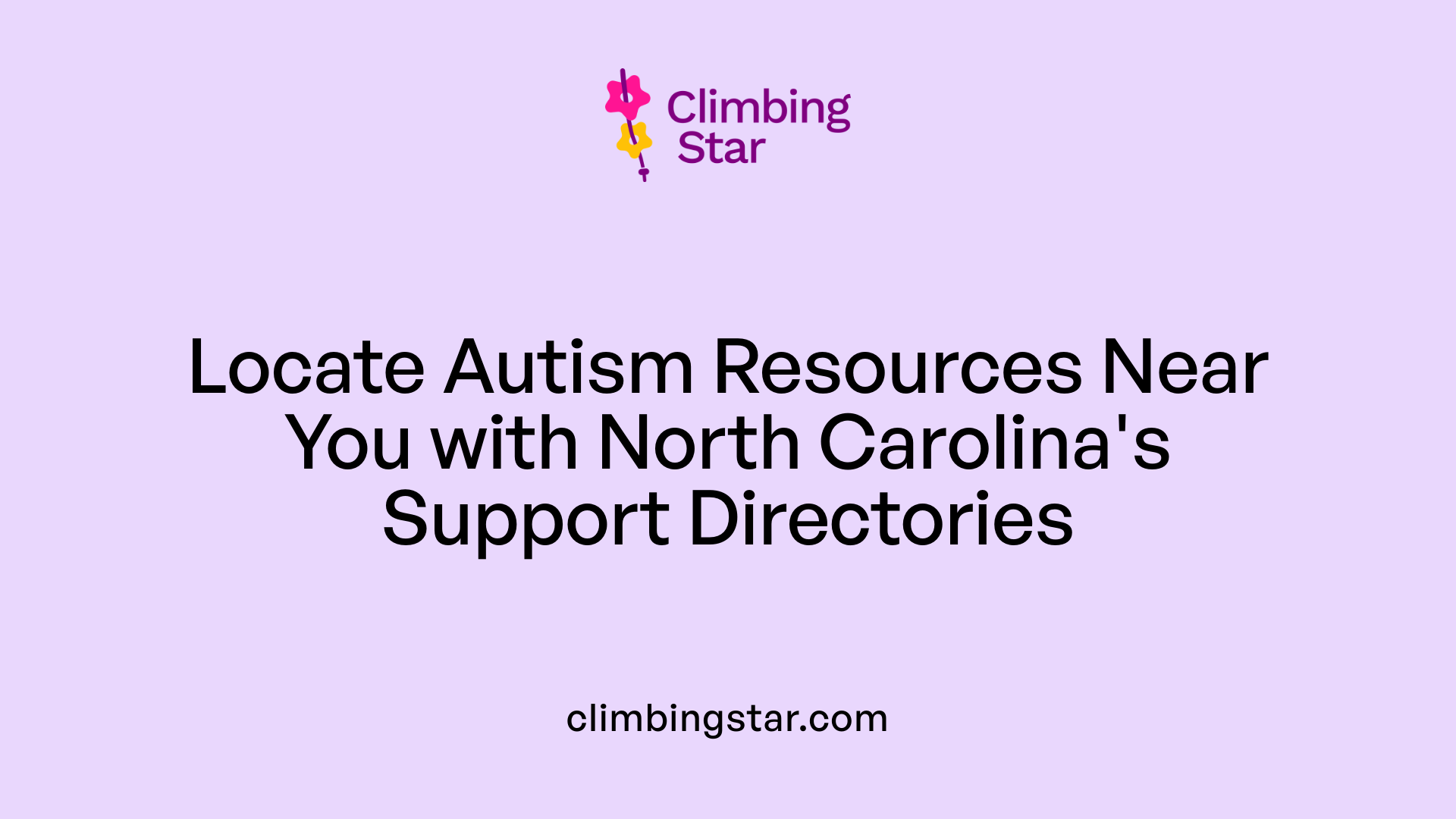
How can I find listings and directories of organizations serving individuals with autism and their families in North Carolina?
Locating the right services and support networks is essential for families and individuals affected by autism. The Autism Society of North Carolina provides a comprehensive resource directory on its website, which offers detailed listings of local programs, support groups, and clinics throughout the state. This directory connects families directly to organizations that can assist with evaluations, therapies, and community engagement.
In addition to the national-level directory, each county in North Carolina has Autism Resource Specialists (ARS). These specialists serve as local contacts who can offer personalized guidance, support, and referrals tailored to specific community needs.
Several specialized organizations contribute to North Carolina's autism services network. The TEACCH® Autism Program, for instance, operates regional centers providing diagnostic evaluations, family consultations, and employment support. The Tammy Lynn Center offers programs focused on education and support for children with autism. The UNC Carolina Institute for Developmental Disabilities plays a vital role in offering clinical services and resources for developmental disabilities.
State agencies also maintain extensive online directories. NC DHHS Vocational Rehabilitation Services, and the North Carolina Infant-Toddler Program list resources that support early intervention and educational development.
Community events and awareness campaigns, such as the annual Fall Run/Walk for Autism and Surfing for Autism on the Outer Banks, further facilitate local connections and community engagement. These events are not only awareness-raising but also bring families together to strengthen access to services.
For easy online access, searching for 'North Carolina autism organizations directory' can direct you to official statewide and local resources, ensuring you find the most current and comprehensive listings available.
| Resource Type | Main Focus | Additional Details |
|---|---|---|
| Autism Society of North Carolina | Statewide autism support and advocacy | Provides online directory and local ARS contacts |
| TEACCH® Autism Program | Diagnostic and employment services across NC | Regional centers in various counties |
| Tammy Lynn Center | Education and family support for ASD | Located in North Carolina |
| UNC Carolina Institute for Developmental Disabilities | Clinical services and research | Offers extensive resource listings |
| NC DHHS Vocational Rehabilitation Services | Employment support for individuals with disabilities | Offers tailored vocational programs |
| Local community events | Raising awareness and community engagement | Examples include Fall Run/Walk for Autism, Surfing for Autism |
Advocacy groups and community programs shaping autism support
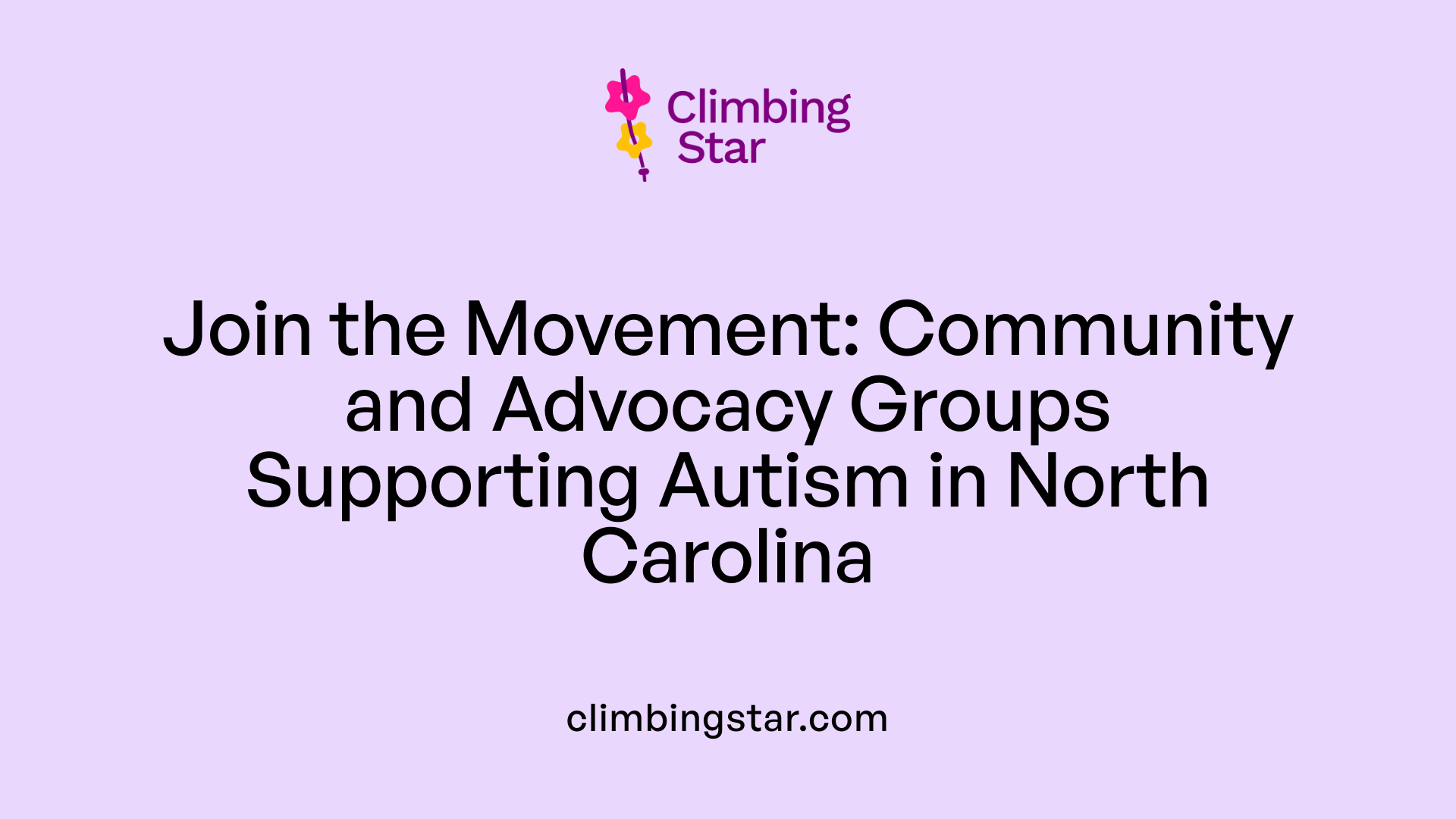
What advocacy groups and community support programs for autism are based in North Carolina?
North Carolina hosts a variety of organizations dedicated to supporting individuals with autism and their families. The Autism Society of North Carolina (ASNC) stands out as a central resource, offering community programs, educational webinars, and local resource specialists in every county. They organize community events such as the annual Fall Run/Walk for Autism, which raises awareness and funds for autism services.
The Arc of North Carolina works statewide to enhance the quality of life for people with intellectual and developmental disabilities, including autism. It provides advocacy, regional services, and collaborates with other entities to improve access to resources.
Family support is vital, and the Family Support Network of North Carolina plays an important role by giving families information and assistance to help navigate available services.
The TEACCH Autism Program, operated through UNC-Chapel Hill, offers clinical services like diagnostic evaluations, family consultation, and employment support. It also provides training for caregivers and professionals involved in autism support.
BFAST is a culturally sensitive organization that offers early intervention and support specifically for Black autistic children, ensuring tailored assistance that respects cultural contexts.
Regional organizations and initiatives further expand support. For example, the North Carolina Autism Society High Country Support Group offers localized support, while programs like Camp Lakey Gap and Summit Support Services provide recreational activities and inclusive programs to promote social engagement and skill development.
Overall, these organizations and programs work together to foster a supportive community environment, advocate for policy change, and facilitate access to educational, clinical, and therapeutic resources for those impacted by autism across North Carolina.
Eligibility, application processes, and insurance coverage
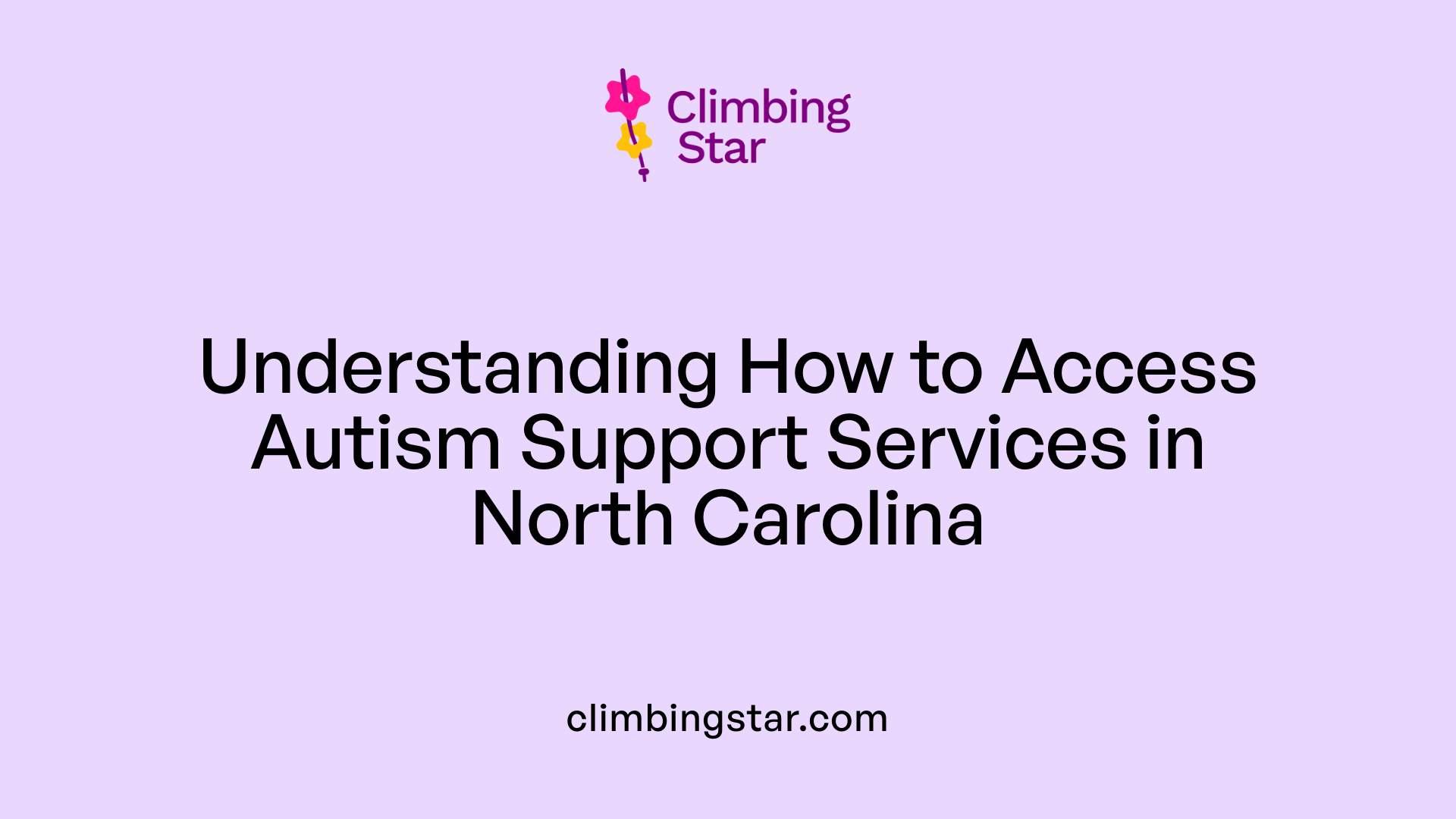
How can I learn about eligibility, application processes, and coverage options for autism-related services in North Carolina?
Understanding the pathways to support for autism in North Carolina involves exploring several resources and programs. Families and individuals can begin by consulting the North Carolina Department of Health and Human Services (DHHS), which provides detailed information about eligibility criteria and application procedures for various autism services.
The Autism Society of North Carolina also offers an accessible online toolkit. This resource guides families through the steps needed to access government-funded programs and services, including assessments, therapies, and support programs.
Eligibility for autism services depends on specific program requirements. For example, Medicaid covers a wide range of therapies such as Applied Behavioral Analysis (ABA) and services provided by the TEACCH® Autism Program. Applications for Medicaid or other programs like the NC Innovations waiver are typically submitted via the state’s online portal, NC TRACKS, or through local Departments of Social Services.
To qualify for services, individuals often need to demonstrate medical necessity through documentation provided by healthcare providers. Care managers and service coordinators can assist with this process.
In addition, private health insurance plans in North Carolina are legally mandated to cover autism treatments for individuals up to 18 years old, with an annual cap of $40,000 established in 2017. Coverage details depend on the specific insurance policy, but most plans include evidence-based therapies such as ABA and TEACCH if authorized.
Support does not end there. Families can also explore additional funding and support programs like ABLE Accounts for financial planning or employment services such as LiNC-IT, a statewide program that facilitates internships and job placements for autistic individuals.
Overall, accessing autism services in North Carolina requires navigating multiple programs and providers. Working closely with healthcare professionals, service coordinators, and advocacy organizations will help ensure appropriate support and services are obtained.
Educational and employment programs supporting autistic individuals
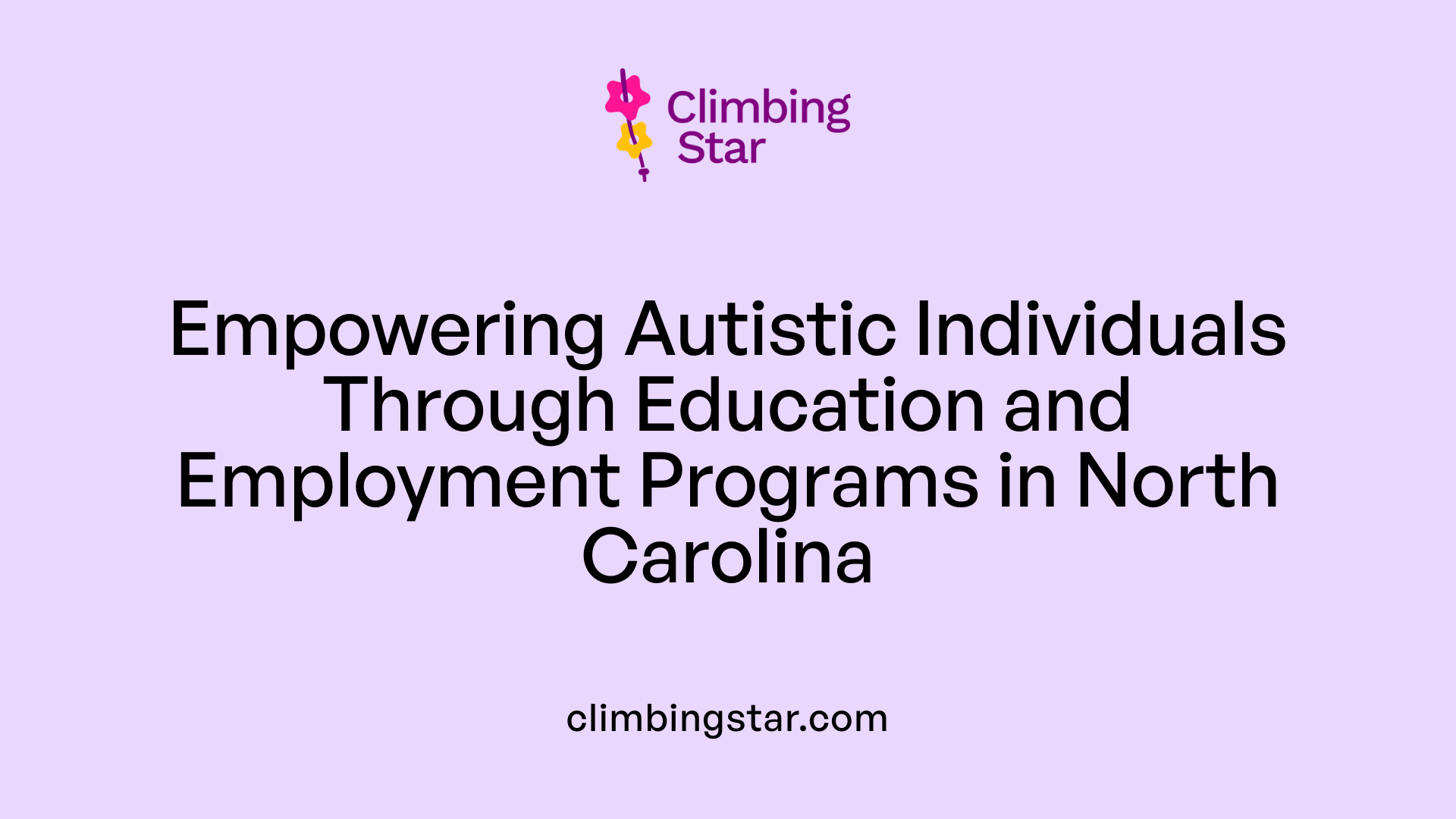
Are there any educational and employment support programs for autistic individuals in North Carolina?
Yes, North Carolina provides a range of programs to support the educational and employment needs of individuals with autism. One prominent resource is the TEACCH® Autism Program, which offers diagnostic evaluations, family consultations, and employment support services for people on the autism spectrum. As part of UNC-Chapel Hill, TEACCH serves individuals across all ages and promotes lifelong skill development.
In addition, the LiNC-IT statewide workforce program is dedicated to helping autistic individuals find internships and jobs. Launched in 2018 and supported by state agencies, nonprofits, and employers, LiNC-IT facilitates paid internships, work-based learning, and on-the-job training. This program partners with organizations like UNC Chapel Hill and the NC Department of Commerce to connect job seekers with employment opportunities.
Several local and statewide organizations further support employment initiatives. For example, the North Carolina Business Committee for Education links employers with educational systems, fostering work-based learning and internship programs tailored to autistic individuals. The Arc of North Carolina and the Autism Society of North Carolina also advocate for employment inclusion and develop job coaching and employment support services.
Educational support is also robust, with services available from programs such as the ABC of NC Child Development Center, which provides educational assessments and therapies. Medicaid coverage, including the Early and Periodic Screening, Diagnostic, and Treatment (EPSDT) benefits, extends to therapy services for children with autism up to age 20 and supports educational needs.
Overall, North Carolina's integrated efforts—including clinical services, workforce programs, and advocacy—aim to enhance educational experiences and improve the transition into meaningful employment, ensuring individuals with autism can reach their full potential.
Supporting Autism Communities Across North Carolina
North Carolina’s comprehensive network of autism services, advocacy groups, regional centers, and educational and employment programs demonstrates the state’s commitment to empowering individuals on the spectrum and supporting their families. Through ongoing community engagement, innovative programs, and accessible resources, North Carolina continues to foster an inclusive environment where autism awareness, support, and opportunity thrive.






